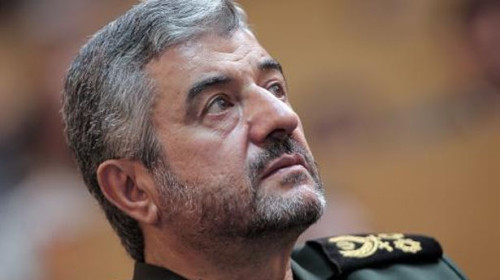On the surface, all was settled inside the Iranian elite over President Rouhani’s visit to New York last week. The Revolutionary Guards, who had vied with Rouhani for authority in the opening seven weeks of his Government, publicly supported the President’s speech in the United Nations and his subsequent messages in high-profile interviews.
Still, there were ripples of tension. Rouhani used an interview with the Washington Post not only to repeat that the Guards should “stay out of politics”, but that he had the Supreme Leader’s backing for the order.
The Guards drew lines for their support: Iran must not show weakness in forthcoming discussions with the US and the 5+1 Powers over Tehran’s nuclear program, and Rouhani must not give up central demands like the right to enrich uranium and the removal of US-led sanctions.
Even as he gave general backing to Rouhani, the head of the Guards, Mohammad Ali Jafari (pictured), chided the President over the historic telephone call between Rouhani and President Obama last Friday: “It was better that no time was given for a face-to-face meeting with Obama and [Rouhani] should have turned down a phone conversation until after the American government has shown its sincerity.”
In an overview for Reuters, Marcus George summarises:
The public comments of ministers, politicians and military commanders represent only a pale reflection of what is likely to be an intense debate within the largely opaque corridors of Iranian power, where policy is often arrived at by laboriously thrashing out a consensus, with [Ayatollah] Khamenei having the final word….
With two weeks to go before the next round of nuclear negotiations…the debate within Iran appears to be intensifying.
“The Revolutionary Guards gave public support to Rouhani’s trip to New York, but made clear that he has to negotiate from a position of strength,” said Scott Lucas….
“Jafari’s comments go further. This is a challenge for Rouhani to deliver on actual changes of U.S. behaviour. ‘Show us the progress’, he’s saying. He’s testing Rouhani to see whether he can get some move forward from [Washington]….
More strident comments by Rouhani’s foreign minister and chief nuclear negotiator Mohammad Javad Zarif on Tuesday appeared to show that Rouhani’s government may be getting the message.
“President Obama’s presumption that Iran is negotiating because of his illegal threats and sanctions is disrespectful of a nation, macho and wrong,” he wrote on Twitter.
For now, however, Rouhani has the advantage of the Supreme Leader’s endorsement. Ayatollah Khamenei’s senior advisor Ali Akbar Nategh Nouri, without naming the Guards, said on Tuesday:
Some of those who criticized do not pay attention to the point that the trip to New York was primarily to untie the knot of the problems of the people and the system.
In the matter of the telephone conversation between the two Presidents, the Revolution’s value, fundamentals and basics were also not violated or trampled. In any case, they [the US] requested this meeting. Why don’t those who oppose it point out that during the trip the American President’s numerous requests to meet with Iran were denied by Iran, and that the media wrote that this matter humiliated Obama?

